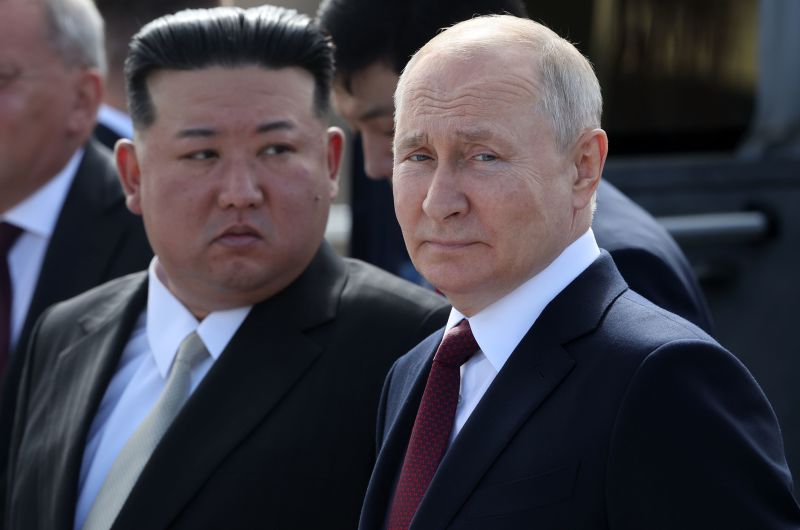North Korea, Russia and China watch on as crisis unfolds in key US ally South Korea
A night of political upheaval in South Korea has upended stability in a key democratic US ally – sending shock waves through the region and Washington at a moment of acute global tension.
South Korean President Yoon Suk Yeol declared martial law on Tuesday night in a surprise decree that was reversed hours later following overwhelming opposition across the political spectrum for what was widely seen as a breach of the country’s vibrant democracy.
The move, which Yoon claimed was necessary to “save the country against anti-state forces” trying to destroy the “constitutional order of liberal democracy,” was met by protests in Seoul and mounting calls for the president’s resignation.
The stunning development appeared to catch Washington off guard. That’s an unnerving reality for the United States military, which has nearly 30,000 troops and its largest overseas base in South Korea, serving as a check against a belligerent North Korea and counterweight to an aggressive China in a strategically critical region.
The turmoil has the potential for significant ramifications at a moment of deepening geopolitical fault lines in Asia, where both North Korea and China are strengthening their alignment with Russia as it wages war on Ukraine.
Leaders in Pyongyang, Beijing and Moscow are likely watching the developments in Seoul with an eye to its potential to undermine a key bastion of US power in the region – and all eyes are now on North Korea, which may be keen to use the political chaos to its advantage.
‘Major ramifications’
The US-South Korea alliance has long been seen by both countries as a cornerstone of peace in the region, where North Korea continues to threaten South Korea and the US with its illegal weapons program.
That threat has only become more acute as North Korea has ramped up its partnership with Russia, sending ammunition, missiles, and soldiers, intelligence officials say, to aid Moscow’s war against Ukraine.
US President Joe Biden has worked assiduously during his time in office to bolster the US partnership with South Korea, meeting Yoon multiple times, referring to the South Korean leader as a “great friend,” and earlier this year passing his “Summit for Democracy” to Yoon to host in South Korea.
Biden’s efforts also included a landmark 2023 summit at Camp David with Japan and South Korea, where the US president navigated around historic mistrust between the two US allies to broker enhanced trilateral coordination.
A US National Security Council spokesperson expressed “relief” after Yoon reversed course on what the spokesperson described as his “concerning declaration,” adding that “democracy is at the foundation” of the US-South Korea alliance.
Despite US assurances that the alliance remains “ironclad,” the surprise move by Yoon could cast a level of doubt on the partnership and weaken the burgeoning Japan-South Korea partnership, observers say.
It also adds another level of uncertainty on the eve of the return to the White House of President-elect Donald Trump, who has previously expressed skepticism about the financial arrangement between the US and South Korea on hosting US troops.
“Yoon’s actions most likely will raise questions about South Korea’s reliability and predictability as an ally and a partner in the eyes of the United States and Japan,” said Rachel Minyoung Lee, a senior fellow at the Stimson Center think tank in Washington.
“This is serious in light of the fact that there is now a stronger-than ever nuclear component in the (US-South Korea) alliance,” she added, pointing to a 2023 mechanism upgrading cooperation on nuclear deterrence between the US and South Korea, which does not have its own nuclear weapons but relies on the US arsenal.
Troubled neighborhood
The political turmoil also raises a potential opening for Kim Jong Un to capitalize on the chaos.
The North Korean leader is known to choose opportune political moments for major weapons tests – for example firing a new intercontinental ballistic missile days before the US presidential election last month.
“We know that North Korea likes to lampoon South Korea’s democratic system whenever there is tumult in Seoul,” said Edward Howell, a lecturer in politics at the University of Oxford in the United Kingdom, who focuses on the Korean Peninsula.
“We should not be surprised if Pyongyang exploits the domestic crisis in South Korea to its advantage, either rhetorically or otherwise,” he said.
The developments – and the potential, now, for a change of leadership in South Korea – are also likely being closely watched by Beijing and Moscow, who both deeply oppose US military presence in Asia.
Chinese leader Xi Jinping and his officials in particular have watched with ire as the US has strengthened its partnerships with allies in the region – in the face of concerns in Washington about a growing threat from Beijing and its deepening security coordination with Moscow.
And Yoon, who’s taken a harder line on North Korea than many of his predecessors, has been a willingly staunch partner of the US.
The Yoon government has also suggested that deployment of North Korean troops into Ukraine could cause it to reassess the level of military support it gives to the war-torn country, to which it does not directly supply lethal arms.
All that raises the international stakes for the current political moment, whatever its outcome for Yoon, according to Howell.
“At a time when South Korea’s interests in the Ukraine war have gained prominence, given North Korea’s now full-fledged involvement, Seoul’s cooperation with allies cannot be hampered by domestic division,” he said.













